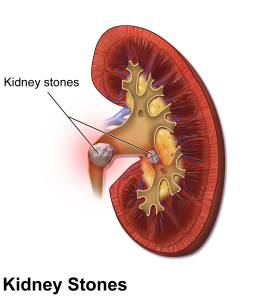Kidney Stones: reasons, re-occurrence, cure and do’s and don’ts
 This is a common recurring problem largely due to the fact that stones are formed from materials which are essential for the functioning of our body. Calcium, Uric acid, Oxalate, Animal Protein etc can cause stones.
This is a common recurring problem largely due to the fact that stones are formed from materials which are essential for the functioning of our body. Calcium, Uric acid, Oxalate, Animal Protein etc can cause stones.
The occurrence and re-occurrence of the stones can be checked through dietary changes.
- an increase in fluid intake
- a reduction in calcium, sodium, animal proteins and oxalate
Stones usually occur in kidneys and gall bladder. The treatment for both sets of stones are separate and the dietary changes for the same are different too.
For this article we will focus on the kidney stones-
There are 4 types of kidney stones.
- Calcium Oxalate: this is the most common type of stone and is formed of calcium crystals and oxalate which is present in animal proteins.
- Calcium phosphate: these stones are also common and they get formed in the body when calcium content is high and the urine has a high PH which means alkaline urine.
- Uric acid stones: These are found when the body releases excess of uric acid which it is not able to dispel and the condition happens for a prolonged period of time.
Uric acid is a byproduct of breakup cells which is caused on account of food that we eat. Though it is dispelled via urine and stool but sometimes it’s removal does not happen completely and this results in formation of kidney stones.
Uric acid on a dietary standpoint increases largely due to breaking up of ‘purines’, which are found in the human body tissue and in certain food products such as beans, peas, liver, animal proteins and certain alcoholic drinks.
Kidneys function as filters and remove this acid from the body but in scenarios where
- the kidneys are malfunctioning or
- the kidneys are performing at a sub optimal level
- the person is a diabetic
- the person has been diagnosed with gout
- the person has been diagnosed with inflammatory bowel disease
- there is Hypocitraturia, a citrate deficiency
- has been subjected to lead poisoning
- there are medical conditions of certain blood cancers, rare anaemia, metabolic disorder etc..
- very high animal protein intake
- has prolonged intervals between subsequent food intakes.
- low urine output of account of lesser fluid consumption
the uric acid removal does not happen completely and it remains in blood leading to the formation of the uric acid stones in the body.
- Struvite stones: these stones have a rare occurrence and they are a result of infections in kidney or urinary tract. These stones are comparatively large and are generally pre-disposed towards female gender due to a higher incidence of UTI (urinary tract infections) in them. These type of stones consist of magnesium ammonium phosphate hexahydrate.
These stones are treated largely through
- antibiotics
- surgery
Please note: for the treatment of these type of stones a high acidic, low protein diet is required.
This diet though needs to be changed every six weeks as the body cannot tolerate a high acidic diet for a longer period of time.
Reduced quantities of protein, phosphorous and magnesium off set by a higher sodium content diet is given to patients.
A word of caution:
For people suffering from heart diseases, liver/kidney failure, tendency of a high blood pressure, susceptibility to pancreatitis, lower blood albumin should not follow this type of diet without consulting a their doctor.
